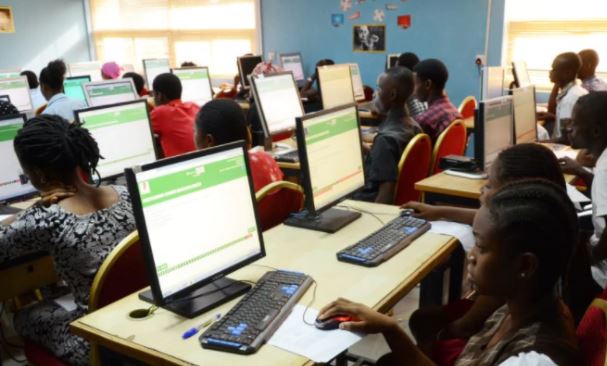Candidates taking a computer-based entrance exam into higher institutions
May I confess upfront that I am a fan of Prof Ish’aq Oloyede, the registrar of the Joint Admissions and Matriculation Board (JAMB). I have been genuinely impressed with the energy, commitment and innovation that he has brought to the organisation since he was appointed as the CEO in 2016. It very much reminds me of the oomph Prof Dora Akunyili brought to the National Agency for Food and Drugs Administration and Control (NAFDAC) when she was appointed as the director-general in 2001. Within a short period, Akunyili had vigorously made NAFDAC’s impact felt all over the country. Till today, many Nigerians, including NAFDAC staff, reminisce over her tenure with smiles on their faces.
Oloyede, as the man charged with leading the body that conducts entrance examinations into higher institutions of learning in Nigeria, also started making his impact felt as soon as he assumed office, confronting the corrosion in the ecosystem — from JAMB itself to the conduct of examinations. The fraud, particularly in the conduct of examinations, was of monumental proportions. The introduction of computer-based test (CBT) improved the process, with JAMB leveraging on technology to tackle malpractices, facilitate assessment and shorten the turnaround time. Oloyede has also, to a considerable extent, cut down on wastes and improved staff welfare since mounting the saddle.
However, things seem to be unravelling with the fiasco surrounding the 2025 unified tertiary matriculation examination (UTME). When the results were released, 78 percent of candidates scored less than 200 out of the 400 obtainable points. Amid the public outcry, Oloyede said the results reflected the “true academic abilities” of the students because JAMB had clamped down on cheating. Dr Tunji Alausa, minister of education, said advanced anti-examination malpractice technologies had made cheating “nearly impossible”. Government officials often talk down on us. They always blame the victims. This rush for self-justification is uncharitable and unfortunate.
I sadly remember when 20 young Nigerians died in a stampede at the NIS recruitment centre in Abuja in 2014. Comrade Abba Moro, then minister of interior, callously accused them of being “unruly”. He is now a senator of the Federal Republic of Nigeria and pro-chancellor and chairman of the governing council of the University of Agriculture, Makurdi, Benue state. Rather than the resort to victim-blaming, the first question should have been around what crowd control measures the recruitment consultants put in place when thousands of applicants were invited to write the test. As it is our custom and tradition in Nigeria, human life hardly matters in our overall consideration.
Advertisement
Back to JAMB. An emotional Oloyede addressed the media on Wednesday, admitting that there was a technical glitch with the marking system which distorted the results of nearly 380,000 candidates in 157 centres across Lagos and Owerri. He took personal responsibility, tendered an apology and accepted that the board’s reputation had taken a hit “despite rigorous quality assurance measures put in place before the examination”. As an anti-cheating measure, answer options were scrambled so that students sitting next to each other would not successfully do “giraffe” since a candidate’s option A may be the neighbour’s option B. Sadly, something went wrong with the technology.
I would like to express my reaction to the shambles through a series of posers. My first line of questioning is: why is JAMB always in a hurry to release results? This might sound contradictory because I just praised Oloyede for leveraging on technology to improve the process. In our days, students used to wait for months to get the results of what used to be called university matriculation examination (UME). These days, the results are ready within the twinkle of an eye — thanks to technology. Candidates do not need to live with the anxiety of checking newspapers daily to know when results will be released. It is great progress but we can now see that it has its own downside.
And this is my point. Technology, as divine as it looks, is not infallible. It would not hurt to subject the work of technology to human review because of possible bugs and breaches. This year, students complained about being unable to log in to their systems. Also, some questions did not appear on the screen. “Up NEPA” (power cuts) also meant some could not write the test at all. These are issues that can be addressed if a review is carried out immediately after the exam — and before the results are released. However, JAMB only does reviews months after the results are released, thereby presenting a fait accompli to the candidates. I want to believe a lesson has been learnt from this.
Advertisement
My second question is: why reschedule exam for so soon? Oloyede announced the technological failure on Wednesday and fixed Friday for resit. We are dealing with hundreds of thousands of probably disoriented teenagers being asked to study for, and re-write, four papers within 48 hours. I am obviously not a good example of a smart student — I was this type that did not want to touch my books for a long period after writing an exam. I just wanted to exhale. (By the way, I hated — and still hate — exams.) It always took a lot for me to prepare mentally and emotionally to write an exam. I hope none of the affected 380,000 candidates is like me, otherwise this is not going to be pretty.
Third question: maybe this is not the first technological glitch? Maybe it has been happening all along and JAMB only papered over it and put up a strong face? Technological failures are universal. I run an online newspaper and technology regularly injures us. There is nothing peculiar to Nigeria about that. However, for years, candidates had been complaining that their UTME results did not reflect what they thought they deserved. Of course, students would always look for an excuse for failing an exam (the blame is always on the examiner), but maybe some of the complainants have a good case. We cannot afford to dismiss every complaint if we really and truly want to progress the system.
Although JAMB acted honourably by owning up to its error this time, there is a risk. I hope it will not become a weapon in the hands of candidates to start questioning the integrity of every result in the future. If I know us well, candidates who actually fail may start saying it is because of a glitch. People write and fail exams on a normal day, technology or no technology. Unfortunately, some react badly. My heart goes to the family of 19-year-old Miss Timilehin Faith Opesusi, who wrote the exam in Ikorodu, Lagos state, and reportedly committed suicide on seeing her score — said to be 146. There is no evidence she was affected by the glitch but nobody should die this way. This is so, so tragic.
My second to the last question: why does JAMB take joy in sending candidates to exam centres that are many miles from home? In this age of technology and cost of living crisis — not to forget insecurity — why should students be sent so far away? The News Agency of Nigeria (NAN) spoke to parents in Cross River state. They were full of lamentations. Mr Jonas Achi, a parent, said the process was complicated for his family — from the registration to writing the examination. “To make matters worse, many children were posted to Akwa Ibom from Cross River for their examination, others to local governments like Obudu, which can take up to eight hours of travelling from Calabar,” he said.
Advertisement
Achi said another challenge was the examination starting at 6:30am. He asked: “How does JAMB expect the candidates to make it to the centre by such time to write their examination?” Johnson Etim, another parent, told NAN: “After going through the pains of registering my daughter, she was still posted to Akamkpa LGA which is a two to three hours journey from Calabar without minding that many of these children are just teenagers. My neighbour’s son was posted to Ikom, which is a four to five-hour journey from Calabar for the same examination. This is a place the boy had never been to before.” This was a common experience nationwide. Now, imagine having to do that all over again!
My last question, which actually should be the only one, is the continued relevance of UTME in the scheme of things. To be sure, this question has nothing to do with the current fiasco. It has been on my mind for a while. Now that we are here, maybe we should now start having an open, sincere conversation over this. The purpose of JAMB when it was established in 1978 was to unify university entrance exams. Before then, universities individually handled admissions. Candidates would apply to universities and each institution would apply its own criteria in picking intakes. JAMB thereafter became the central body conducting entrance examinations and offering places to candidates.
Over time, the quality of candidates being offered admissions by JAMB began to fall, amid reports of exam fraud. Candidates were hiring exam writers to do the heavy lifting for them, while some centres were notorious for aiding and abetting cheating. I recall the story of a lady who got the highest score in UME but could barely write her name! Worried by the menace, universities succeeded in getting a reluctant JAMB to let them organise what they called post-UTME tests as another layer of filtering candidates. Some candidates who were scoring high hundreds in UTME suddenly found themselves struggling to get decent scores in post-UTME tests. This helped the weeding process enormously.
As time went by, universities toughened up. Today, UTME score is just one of the three items in the basket. A candidate’s O-Level result now goes into the basket, weighed along with UTME score and post-UTME result. This has helped to address the gaming of UTME. But maybe we should take a step further by taking the function of conducting entrance exams from JAMB? As suggested by some commentators, JAMB could still be the central body co-ordinating admissions and setting policy standards, but the schools can offer admissions based on O-Level results and their own tests. Maybe JAMB is no longer fit for purpose? Maybe the time has come to debate this matter more seriously?
Advertisement
AND FOUR OTHER THINGS…
BOKO BOUNCE
Nigeria has been recording a reverse in the war against terror. Lt Gen Olufemi Oluyede, who succeeded the highly efficient late Lt Gen Taoreed Lagbaja as the army chief, has carried out extensive shuffles but maybe they are yet to bed in — assuming square pegs are in square holes. What we can see is that Boko Haram is in resurgence and the gains of recent years are fast disappearing. Gen Chris Musa, the chief of defence staff, thinks the upsurge is a spillover from the onslaught on terrorists in the Sahel region. He also blamed porous borders. We need to look inward as much as we look outward. We cannot afford renewed terrorism and insurgency. Distressing.
Advertisement
‘JAPA JANTIS’
Mr Afolabi Ayantayo, the Lagos state commissioner for establishments and training, revealed last week that three in 10 civil servants sent on foreign training did not return to Nigeria. In simple English, they opted to “japa”. This is not completely new — for decades, African athletes have regularly disappeared during international competitions in advanced countries. Ayantayo said it is undermining Governor Babajide Sanwo-Olu’s programme of international training to improve the state’s civil service. Maybe Lagos should start patronising local institutions. I won’t be surprised if these defectors are still being paid in full. We shouldn’t be losing on both sides, should we? Ghosts.
Advertisement
CUT AND PASTE
Here we go again — trying to create a solution to solve a problem without understanding its root. The house of reps is cooking a bill to impose a six-month jail term on qualified Nigerians who fail to vote. That means 68 million Nigerians might have gone to jail for not voting in the 2023 elections. Pray, what is Nigeria’s prison capacity? How many judges do we have? What is the feeding budget for prison? But why are we proposing a law on compulsory voting? According to Hon Benjamin Kalu, the deputy speaker, it is because that is what obtains in Australia! Can you beat that? I find the process of lawmaking (and policymaking) in Nigeria not only very shallow but incredibly bemusing. Cruise.
Advertisement
NO COMMENT
Wait for this: Nigeria is about to establish an agency to “eradicate” malaria. The name? NAME! Yes, the National Agency for Malaria Eradication (NAME). You mean it is so easy to “eradicate” malaria and we haven’t created an agency to do the job since 1914? I’m sure it’s some smart guys at work. Meanwhile, we did not create any agency to eradicate polio. And there is now a malaria vaccine. Since President Bola Tinubu ordered “immediate” implementation of the Oronsaye report to reduce the size of government, we have been busy creating more agencies weekly. What next? A bill to establish the Bureau for the Repression and Eradication of Acne and Diarrhoea (BREAD)? Hahahaha.











